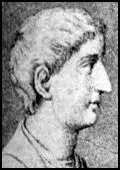Sallust

Gaius Sallustius Crispus (Sallust) was born Amiternum in the country of the Sabines in 86 BC. He became a tribune of the plebeians in 52 BC where he gained a reputation for being a strong supporter of the populares. In 46 BC Julius Caesar appointed him governor of the province of Africa.
After the assassination of Caesar, Sallust retired from political life and spent his time writing history books. Only two of these, The Jugurthine War and The Conspiracy of Catiline have completely survived. We only have fragments of the book that he wrote about the Roman Empire.
Sallust died in about 35 BC.
Primary Sources
(1) Sallust, The Conspiracy of Catiline (c. 40 BC)
Kings are more suspicious of good men than of bad, and always fear men of merit... the Romans... introduced a new system in which authority was divided between two annually elected rulers; the limitation of their power, it was thought, would prevent them being tempted to abuse it.
(2) Sallust, The Jugurthine War (c. 40 BC)
The Romans, he (King Jugurtha) said, were men with no sense of justice and of insatiable greed, the common enemies of all mankind... their lust for empire, made them regard all kings as potential foes. "At the moment," he went on, "I am the object of their attack, as the Carthaginians were some time ago... So it will go on: they will always choose the richest victim they can find."
(3) Sallust, The Jugurthine War (c. 40 BC)
The lower classes... whose ability to earn or to obtain credit depended solely on the labour of their hands, left their work to follow Marius about, regarding their own needs as less important than his advancement. The result was that the nobles were defeated, and for the first time in many years a newcomer to politics and was elected consul.
